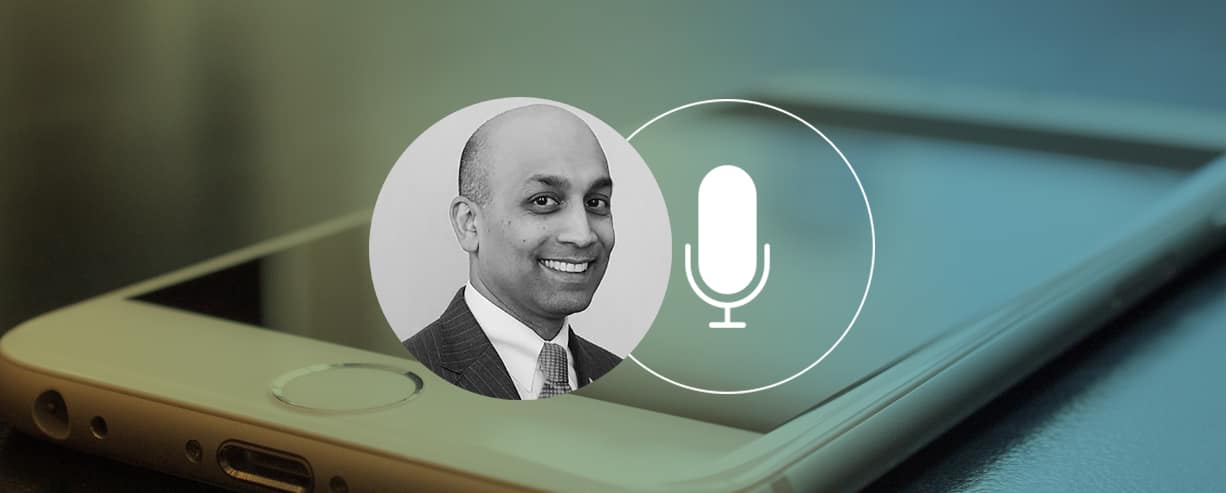
Our Interview with Seasons Hospice Chief Medical Officer Dr. Balu Natarajan on the M1 Podcast
- Podcast /
- Product Leadership /
Addressing the Logistical, Legal and Technological Barriers to Improving Patient Experience (Ep. 45)
Balu Natarajan, M.D. is a graduate of Northwestern University Medical School and has been the Chief Medical Officer of Seasons Hospice since 2005. He served in various capacities for Seasons from 2000 until 2005, including holding the position of Medical Director of the Illinois program.
Board-certified in internal medicine, hospice and palliative care, and sports medicine, Dr. Natarajan has authored book chapters and articles in peer-reviewed journals. He has also lectured across the United States and around the world, including at the Annual Meeting of the American College of Physicians. He won the Scripps Howard National Spelling Bee in 1985.
How to get this week’s and past podcast episodes:
The Mobile First podcast is available for free on iTunes where you can easily download it straight to your computer or mobile device. We encourage you to subscribe to the Mobile First podcast on iTunes so you won’t miss an episode. If you are an Android user, you can also download the podcast for free through Stitcher. If you don’t have access through iTunes or your phone, you can download the podcast here or listen straight from the player below:
Key Insights from our Conversation
- Dr. Natarajan loves helping people and he learned early in his career that he is one of those physicians who can inspire other physicians to be better or to improve their workday to be able to do more for people. His current role in Seasons Hospice allows him to support 4700 patients a day through hundreds of physicians, hospice aids, social workers, nurses, chaplains and other team members who work together.
- He loved technology as he was growing up and thought he would be doing computer or software work. When he was 16, he went to a science show and one of the sessions featured a cardiologist who passed around an artificial heart after talking to them about it. He was hooked to science the moment he held that heart in his hand.
- His accidental journey to Hospice started when he needed a job for a year when his wife needed to go somewhere for school. He became a hospitalist for a year taking care of hospitalized in patients. He found himself referring patients to Hospice then did a talk one night during a team meeting, and it involved from there.
- Hospice is based in Chicago, Illinois and had just turned 20 years old. They are a joint commissioned Medicare certified hospice and their job is to take care of patients with life expectancy of 6 months or less. They are the largest employer of music therapists across the country and have a foundation which supports their patients non-medical needs. The communities they serve are generally urban and sub-urban markets. They serve 4700 patients a day in 29 cities from coast to coast.
- Dr. Natarajan’s focus is patient experience and he has all the support of all the doctors as well as the Nursing and Education and Quality Support of Care departments. His team takes this incredibly seriously and what they have been working on right now is getting the right person to the right patient at the right time, given the backdrop of short length of stay. Basically, this pertains to how they can serve to those who are acutely in need who just came into the program, and at the same time, getting to the people that they have been taken care of for months now. It’s not an easy thing to do and they are hoping that technology can have a huge impact on their ability to do this.
- He believes that the areas where technology can really make an impact on in their field is acuity scale, patient perceptions and developing a tool which can take all the triages and determine which patients need to be prioritized overlaid with geography.
- The challenges they are encountering right now in applying technology include connectivity (which is the biggest), rules and regulations which clarify which is a visit or not, and other logistical, legal and technological barriers.
Rapid Fire Questions
- What is your definition of innovation?
Innovation is solving a problem before somebody asks.
- Would you put more emphasis on the idea or the execution? How would you weigh each of them and why?
Lots of people have ideas and most end with that. The real sweet spot is taking that idea and then testing it until it becomes something which can be executed and can scale. The idea is 10% and execution is 90%.
- What is your biggest learning lesson on your journey so far?
That everything is great in theory but none of that is relevant if you do not count the human being or the relationships involved. There are lots of good ideas and wonderful notions and concepts in books but it’s the human aspect that makes anything possible and can also makes things impossible.
- What is your favorite business book?
Being Mortal by Atul Gawande
Start with Why by Simon Sinek
- What is your favorite digital resource or apps?
Uber
United
MLB Apps (Major League Baseball)